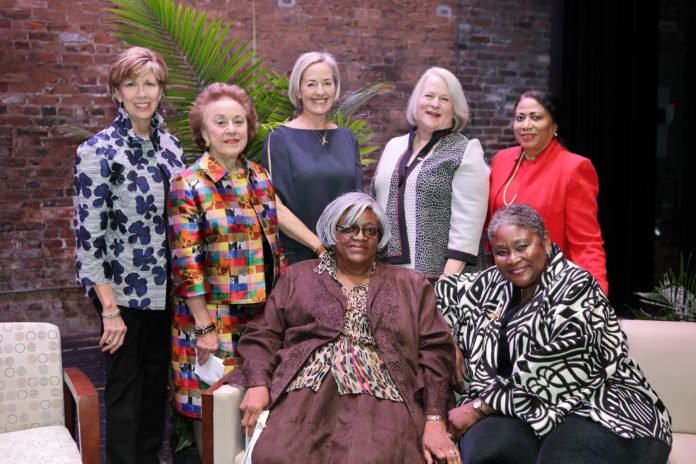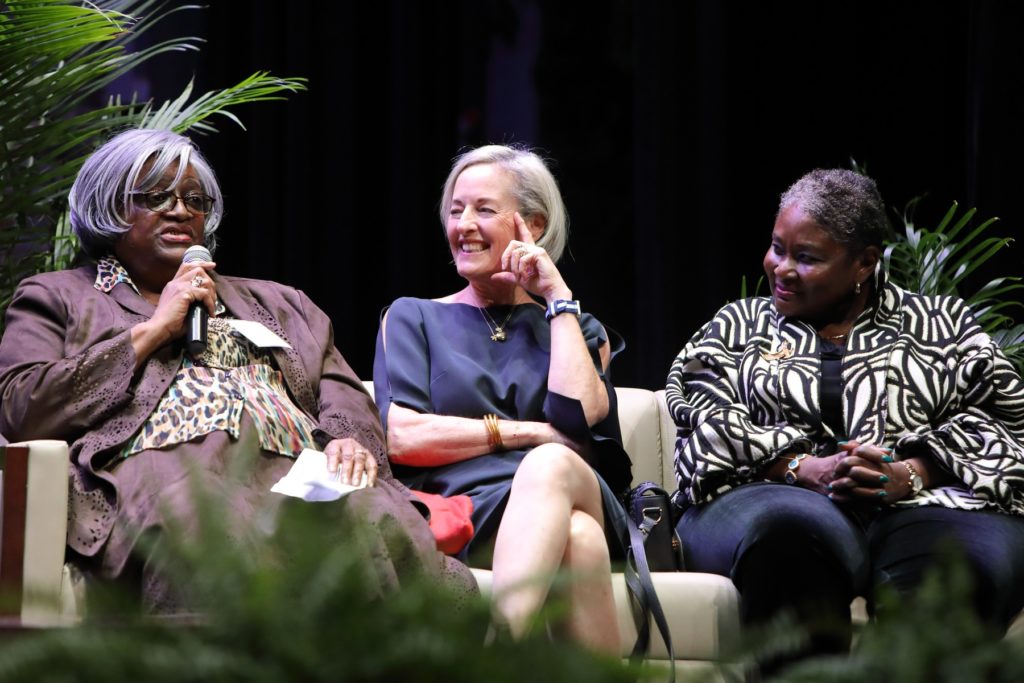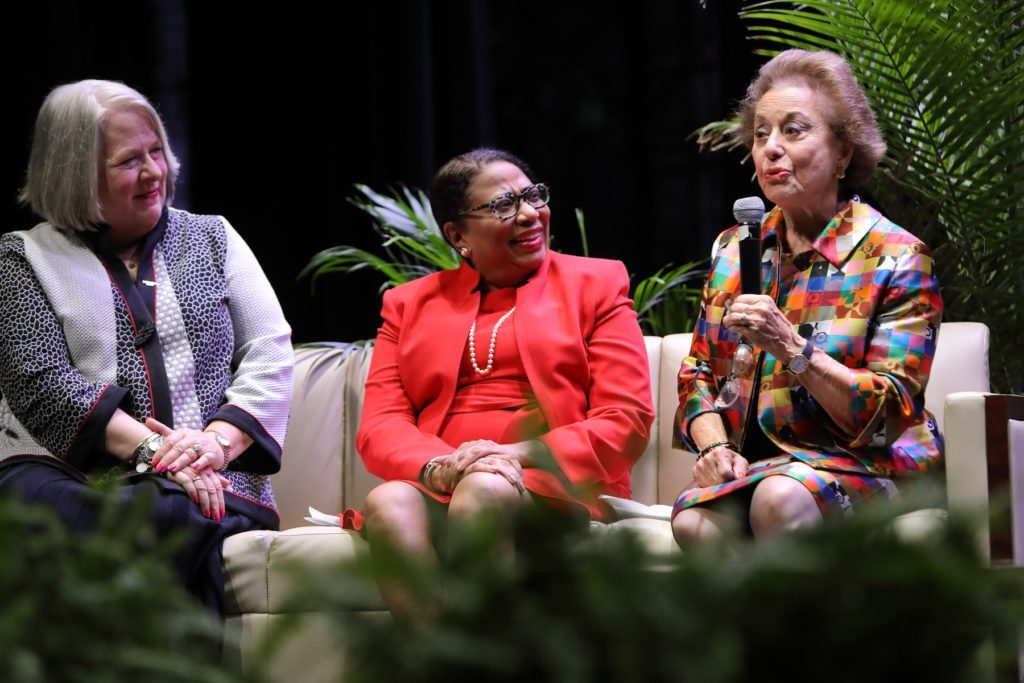
When she earned her degree from Mercer Law School in 1919, Kathryne Pierce was what today we would describe as a nontraditional student. Macon-born, she was believed to be 36 at the time, married to William E. Jackson, and with three preteen and teenage daughters. Her classmates called her “Mrs. Jackson” and voted her their president. That may not seem so unusual — except when you understand that she was also the school’s first female student and graduate.
Though the now-defunct Atlanta Law School had previously welcomed women into its classrooms, Mercer preceded both Emory University and the University of Georgia’s law schools in the practice. The august Harvard Law School did not even admit women until 1950.
Though Kathryne Pierce’s matriculation kicked off 100 years of equal opportunity for both genders in the Law School’s enrollment, it did not open the female-student floodgates right away.
When Leah Chanin, ’54, came to Mercer as a student in 1950, there was only one other woman in her class. After withdrawing from school for a year when her husband, a World War II veteran, was redeployed, when she returned, “I was the only woman in the student body and remained so for my entire time in law school.” There weren’t any female faculty members, either. Though she herself returned to Mercer as the director of the law library and a law instructor in 1964. She was the first female faculty member.
What a difference 40 years can make. Now women regularly represent half or more of entering classes at Mercer Law School. The 1L class of 2019 comprised 44 percent female students. The previous two years, the figure was 54 and 57 percent.
In November, Professor Chanin joined five other distinguished alumni onstage at the Douglass Theatre to commemorate the centennial of women at Mercer Law School, moderated by Dean Cathy Cox, ’86. The panelists included the Honorable Mary Alice Buckner, ’73; Ann Baird Bishop, ’76; the Honorable Wendy Shoob, ’77; the Honorable M. Yvette Miller, ’80; and Evett Simmons, ’82.
Their motivations for choosing to study law varied.
Shoob’s father was a lawyer. So was her boyfriend at the University of Virginia. Working one summer as an intern for Sen. Sam Nunn, “I realized that I wanted to work on Capitol Hill,” she says. “There was no more thrilling place to be, and if I was going to work there I had to be a lawyer, because the women who were not lawyers were secretaries.”
While Shoob had familial motivation, Buckner had no role models or kinfolk who were lawyers. Neither did Chanin (“very unusual for a Jewish family, but there weren’t any,” she quips). Both were drawn to the legal profession from personal desire. Likewise, Simmons says, “The first time I met a lawyer I was in college, but I knew that they were out there, and I knew that I wanted to help people. I had a strong, deep-seated faith there was something that I had to do.”
Miller, as a child in 1960s Middle Georgia, knew only one Macon attorney. But as a young woman she was inspired toward justice by a discrimination lawsuit filed by her father, a white-collar worker at Robins Air Force Base, which was then littered with “Colored” and “White” signs.

Her father told her, “‘Well, Yvette, some things are just so important that you have to stand up for them,” she recalls. “So those are the kind of experiences that I had that led me to want to go to law school. … I believe in equality, I believe in fairness, and I’m just proud to have been a double-Bear — which certainly helped me to do what I do.”
Bishop jokes that her decision to come to law school was based on an avoidance of any graduate studies requiring subjects like organic chemistry. “Nursing school was out, engineering was out,” she says. “I was an English major, and lawyers have to speak English in this country.” So, hello Mercer.
She adds that she didn’t mind the unbalanced ratio of genders among students: “I had always wanted to go to a boys’ school, so that was fine.”
Still, that gender imbalance, and its attendant sexism, created a sense of isolation for others. Buckner, the only woman in her class at a time when there were, at most, only three female students in the entire enrollment, recalls a blunt snub from a male classmate in her very first Mercer Law class — but that was apparently sparked by her race more than her gender.
In her years as a student herself, Chanin recalls some vivid run-ins with good ol’ Southern boys in the hallways.
“They had a difficult time with somebody not only being a woman, but a flaming liberal,” she says. In the ’50s, guys thought it was hilarious to pop a woman’s bra strap from behind. One of her classmates did just that. On instinct, Chanin swung around, punched — and knocked the guy’s tooth out. “I never had any problem with those boys after that.”
Back then, the Law School was so unequipped for both genders, there were no women’s restrooms in Ryals Hall, the school’s original home on main campus. “Finally the dean took pity on me,” Chanin said. Instead of having to scurry to the library next door, he let her use the bathroom in his suite.
When the other centennial panelists were themselves students, Chanin was still the only woman on the faculty. Even by herself, she made a big difference.
“Thank God for Leah Chanin,” says Miller. “And thank you, Mercer, for having her here [as a professor] for those of us that needed to see what it was like to be a girl and look good every day and wear your high heels — and be smart, too.”
If the women of Mercer Law faced obstacles and adjustments in the classroom, they encountered new ones once they entered the working world.

“I could not get a job, I could not get a job,” Chanin says — even though she’d graduated at the top of her class. (Despite her grades, she was not named Mercer Law Review editor-in-chief, an oversight she now believes was due to gender bias). A bank offered her a $75-a-week position in their trust department, but she didn’t take it. Only four years after graduation did she become a practicing attorney.
Following graduation, Shoob interviewed with a DA’s office in Colorado. The job candidates were narrowed to two: herself, and a man. The man got it. After getting by as a waitress, she was eventually hired by the Equal Employment Opportunity Commission. Where she was hit on, twice, by her superior.
On the very first day, he walked into her office, closed the door, and said, “‘You have the most beautiful eyes,’” Shoob recalls with amused horror. “At the EEOC!”
At her first job as a trial attorney at a law firm, Simmons quickly became aware of a similar kind of objectification from male colleagues: “They look at the way you walk.”
Post #MeToo, things presumably are better now in the legal profession. However, women attorneys are still expected to balance professional and personal lives in ways their male colleagues aren’t.
“The most important decision you could make is who you marry, if you decide to marry,” says Chanin, who herself had a long marriage and raised four children while working. “If you don’t have a supportive spouse, you’re in trouble, because you need someone to understand that you’re not going to walk in the door at 5 o’clock every day — and that you can’t be responsible for the whole family.”
In their various ways, in Mercer Law School and since graduation, the centennial panelists have been role models and trailblazers. But they don’t see it that way. They see advancement for women in the legal world as a kind of group effort, built over generations.
Bishop says she took things for granted in her early years, but “I did later realize I was standing on the shoulders of the women that had gone before… I came along at a really perfect time.”
Likewise, Simmons says she appreciates the role models who have shown her that a female attorney can have smarts and strength without being ruthless: “I have been blessed because there have been women that have come before me, such as here, who have allowed me not to be as tough, not to be as mean, not to be as hard and still succeed.”
As for current female students at Mercer Law, Judge Miller has some career advice for when their school days are behind them.
“You’ve got to stay focused on what it is that you offer so that you can offer it to the best of your ability,” she says. “Today, women have to seek not only to go into the firms, but you need to be the partner, you need to consider being the rainmaker or be the managing partner.
“Why wouldn’t a woman want to go to the top?”








